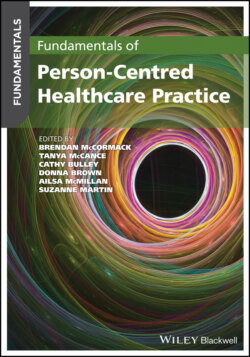Читать книгу Fundamentals of Person-Centred Healthcare Practice - Группа авторов - Страница 112
Additional learning activities
ОглавлениеWe have devised the following learning activities that can be undertaken before, after or during your reading of Chapter 6.
1 Positioning professionalism within the PcPFGo to the PcPF on page 000 and look at the different domains and make some notes on the following questions.Which components would you associate with professionalism?How do these fit with your earlier thinking of the meaning of professionalism?What other factors not stated in the model link to professionalism?Once you have read the chapter go back to your notes. Reflect on any ways in which your thinking has changed or your prior assumptions about professionalism have been changed as a result of your reading.
2 Standards for professional practiceIdentify the relevant documents for your professional group and at least one other.Explore the common elements of professional practice that are included in these documents.
3 Legal and ethical responsibilitiesRead the short case study below and make notes on each of the discussion points.Jean Jones is a 35‐year‐old woman who lives alone. She has some learning difficulties and is unable to read and write. She has a key worker who visits three times a week to help with life skills such as budgeting and housekeeping. She has started a relationship with a young man she met at the local community centre. The key worker is concerned about how far this relationship will go and suggests accompanying her to visit the general practitioner to discuss contraception and Jean's sexual health. At the appointment the key worker stresses that Jean is unable to understand the consequences of having unprotected sexual intercourse.
Discussion points
What professional issues does this case study raise?
Using the PcPF, explore which of the components of the person‐centred processes domain you would apply in considering Jean's needs, preferences, wishes and rights.
Reflective notes
In your discussion you may have considered issues such as capacity to consent, stigma, autonomy and power. As a vulnerable person Jean may lack capacity to consider the consequences of her action, for example an unplanned pregnancy. In addition, the healthcare professionals must also consider whether sex is consensual. This must be balanced with Jean's human rights to engage in an intimate relationship. In relation to the PcPF, you may have highlighted shared decision making, working with the person's beliefs and values and providing holistic care. Jean should not be defined by her disability but as a person with needs, preferences and desires. Professionals may also consider their own responses and assumptions or even prejudices when faced with such ethical dilemmas.
If you are interested in reading further about this issue, see:
www.bihr.org.uk/learning‐disability‐autism‐and‐human‐rights
https://journals.sagepub.com/doi/full/10.1177/1363460715620576
https://improvement.nhs.uk/improvement‐hub/learning‐disabilities
